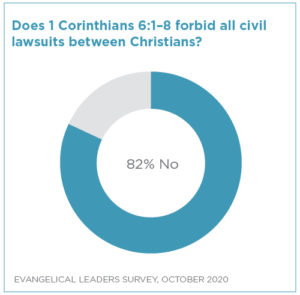
While 82 percent of evangelical leaders said that 1 Corinthians 6:1–8 does not forbid all civil lawsuits between Christians, they also indicated that lawsuits should not be the typical way Christians resolve conflict, according to the October Evangelical Leaders Survey. Paul, in his first letter to the church in Corinth, chastises members who are quarreling with each other in a court of law. Although he is reprimanding their actions, evangelical leaders believe he isn’t necessarily prohibiting civil suits.
“Paul begins his letter to the Corinthians by reminding the church how they resolve conflict,” said Walter Kim, president of the National Association of Evangelicals (NAE). “‘If any of you has a dispute with another, do you dare to take it before the ungodly for judgment instead of before the Lord’s people?’ This correlates with Jesus’ encouragement in Matthew 18:15–20 for brothers and sisters in Christ to work amongst themselves to resolve conflict.”
 Greg Williams, president of Grace Communion International, said, “Obviously it is a bad witness of Christian brothers and sisters to take one another to public court to resolve conflict, especially when it is the case of members of the same congregation as in the Corinth scenario. In the 21st century even Christians need legal contracts of agreement and may have to settle disputes in the public court. Nonetheless, it is best when members can sort out matters of conflict by coming together for open discussion, prayer and the goal of resolution.”
Greg Williams, president of Grace Communion International, said, “Obviously it is a bad witness of Christian brothers and sisters to take one another to public court to resolve conflict, especially when it is the case of members of the same congregation as in the Corinth scenario. In the 21st century even Christians need legal contracts of agreement and may have to settle disputes in the public court. Nonetheless, it is best when members can sort out matters of conflict by coming together for open discussion, prayer and the goal of resolution.”
Larry Graber, executive director of KIN International, had a business career as a professional negotiator. He does not believe Paul forbids all civil lawsuits among Christians. “However, any civil lawsuit between Christians should be a last resort, after pursuing all reasonable efforts to resolve matters without litigation, including use of professional negotiators and binding arbitration. We live in a very complex world where resolution is sometimes very difficult. Having the possibility of a civil lawsuit can provide an incentive to amicably resolve a dispute between Christians,” he said.
Kim added, “We should do all we can to avoid taking Christian brothers and sisters to court. But our responsibility doesn’t start and stop there. If we are engaged in a lawsuit, we need to remember that we represent Christ at all times — including in court and during negotiations. We should have the highest principles of fairness and seek what is best for all. It is also our civic duty to make sure laws are held to the highest standard in order that we and others may avoid frivolous lawsuits.”
The Evangelical Leaders Survey is a monthly poll of the Board of Directors of the National Association of Evangelicals. They include the CEOs of denominations and representatives of a broad array of evangelical organizations including missions, universities, publishers and churches.



 View All Surveys
View All Surveys 




























